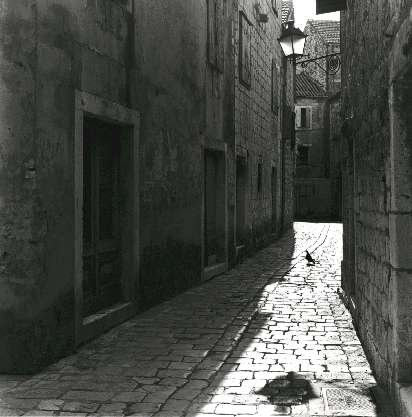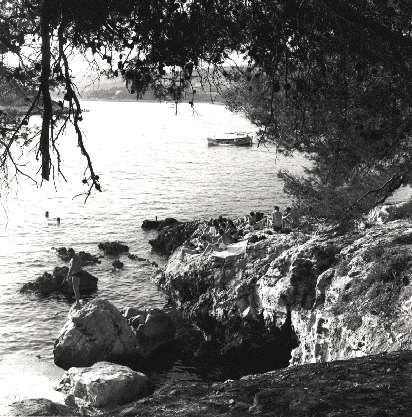High Season, Croatia
 In periods of 1995 and 1996, I was living and working in the Grand-Duchy of
Luxembourg. Among my colleagues were two Croats, Darko Soric and Alan Kuresevic. I ate
lunch with Darko nearly every day as languages and expertise separated the workforce into
different groups. To many of us at the lunch table, the condition of the former Yugoslavia
was inconceivable, and the idea that a war had been or was still raging so near was hard
to believe. True, Luxembourg is across Europe from Croatia, but Europe is very small
relative to the US.
In periods of 1995 and 1996, I was living and working in the Grand-Duchy of
Luxembourg. Among my colleagues were two Croats, Darko Soric and Alan Kuresevic. I ate
lunch with Darko nearly every day as languages and expertise separated the workforce into
different groups. To many of us at the lunch table, the condition of the former Yugoslavia
was inconceivable, and the idea that a war had been or was still raging so near was hard
to believe. True, Luxembourg is across Europe from Croatia, but Europe is very small
relative to the US.
Naturally, we had many questions for Darko. He handled the situation well, answering
all the questions we put forth about what it was like to be in a country where war was a
part of every day. But he also spoke of Croatia outside the context of war. He talked
about the people, about the way of life, and also talked of the beauty of the coast. I was
interested in visiting Croatia for many reasons and expressed that interest to Darko. I
was curious to see what five years of war had done to the country, and I was also
interested in visiting the coast before the tourism industry was fully functional again.
The Croatian coast, from Istria all the way to Dubrovnik, had traditionally been a place
for Europeans to vacation.
It was arranged that I would meet Darko and Alan (who, in addition to working for the
same company, were also brother’s-in-law) in Zagreb in August, stay with Alan’s
family, and then travel by bus to the coast to their house on the island of Murter. My
purpose was really two-fold, first I had given myself a photo assignment, and second I
need a vacation with some time touring old cities and relaxing on beautiful beaches. It
had been another cold and dreary summer in Luxembourg.
 The
title of the photo exhibition, High Season, Croatia, reflects my dual purpose of
visiting Croatia. High season is a term used in Europe to define the time when most the
country is on vacation. For anyone who has ever spent time on a highway in France dodging
slow moving caravans with yellow license plates, you’ll quickly determine that the
high season for the Dutch is July. If you have ever visited Paris in August, you’ll
find more foreigners in the city than Parisians, as the entire city appears to be on
vacation. In Croatia, the high season is August, and traditionally the vacation
destination is the coast. This photo exhibition reflects both my touring of the Croatian
coast and attempts to record the return of tourism to Croatia.
The
title of the photo exhibition, High Season, Croatia, reflects my dual purpose of
visiting Croatia. High season is a term used in Europe to define the time when most the
country is on vacation. For anyone who has ever spent time on a highway in France dodging
slow moving caravans with yellow license plates, you’ll quickly determine that the
high season for the Dutch is July. If you have ever visited Paris in August, you’ll
find more foreigners in the city than Parisians, as the entire city appears to be on
vacation. In Croatia, the high season is August, and traditionally the vacation
destination is the coast. This photo exhibition reflects both my touring of the Croatian
coast and attempts to record the return of tourism to Croatia.
No attempt was made to be political in choosing the photographs exhibited. Indeed,
perhaps two photographs need to be explained so that they are not considered to be showing
the results of war. The photograph, Alan and Marina, Murter, 1996, shows Alan on
crutches. Alan is not a wounded war veteran – he tore some ligaments in his ankle in
a mishap in Luxembourg. Zagreb, 1996, does not show a basketball court damaged by
gunfire or shelling. Instead, it represents to me the emptiness and coldness of the city
when a lot of the residents are on the coast.
Pictures such as Sunbathers on Rocks, Island of Hvar, 1996, Waiting for the
Ferry, Hvar, 1996, and Kids Playing, Island of Hvar, 1996, made me think about
the war. In the photographs of the kids playing, I wonder if this is the first time they
have been to the coast since the war began, I wonder how the war may (or may not) have
affected them. I wonder if they are even Croatian.
This exhibition was first shown in Lafayette, Indiana, in 1998.
 In periods of 1995 and 1996, I was living and working in the Grand-Duchy of
Luxembourg. Among my colleagues were two Croats, Darko Soric and Alan Kuresevic. I ate
lunch with Darko nearly every day as languages and expertise separated the workforce into
different groups. To many of us at the lunch table, the condition of the former Yugoslavia
was inconceivable, and the idea that a war had been or was still raging so near was hard
to believe. True, Luxembourg is across Europe from Croatia, but Europe is very small
relative to the US.
In periods of 1995 and 1996, I was living and working in the Grand-Duchy of
Luxembourg. Among my colleagues were two Croats, Darko Soric and Alan Kuresevic. I ate
lunch with Darko nearly every day as languages and expertise separated the workforce into
different groups. To many of us at the lunch table, the condition of the former Yugoslavia
was inconceivable, and the idea that a war had been or was still raging so near was hard
to believe. True, Luxembourg is across Europe from Croatia, but Europe is very small
relative to the US. The
title of the photo exhibition, High Season, Croatia, reflects my dual purpose of
visiting Croatia. High season is a term used in Europe to define the time when most the
country is on vacation. For anyone who has ever spent time on a highway in France dodging
slow moving caravans with yellow license plates, you’ll quickly determine that the
high season for the Dutch is July. If you have ever visited Paris in August, you’ll
find more foreigners in the city than Parisians, as the entire city appears to be on
vacation. In Croatia, the high season is August, and traditionally the vacation
destination is the coast. This photo exhibition reflects both my touring of the Croatian
coast and attempts to record the return of tourism to Croatia.
The
title of the photo exhibition, High Season, Croatia, reflects my dual purpose of
visiting Croatia. High season is a term used in Europe to define the time when most the
country is on vacation. For anyone who has ever spent time on a highway in France dodging
slow moving caravans with yellow license plates, you’ll quickly determine that the
high season for the Dutch is July. If you have ever visited Paris in August, you’ll
find more foreigners in the city than Parisians, as the entire city appears to be on
vacation. In Croatia, the high season is August, and traditionally the vacation
destination is the coast. This photo exhibition reflects both my touring of the Croatian
coast and attempts to record the return of tourism to Croatia.